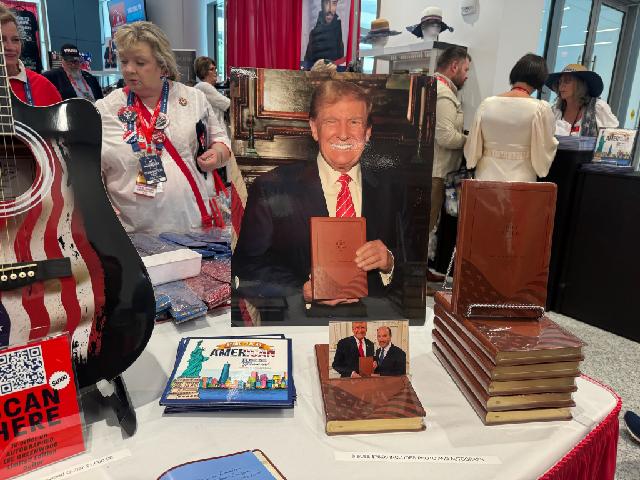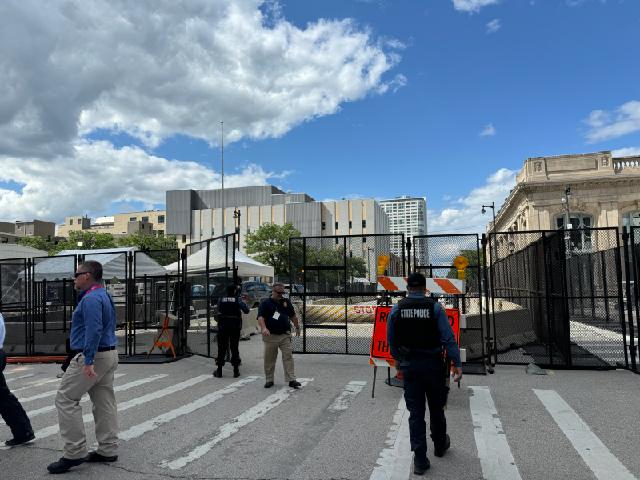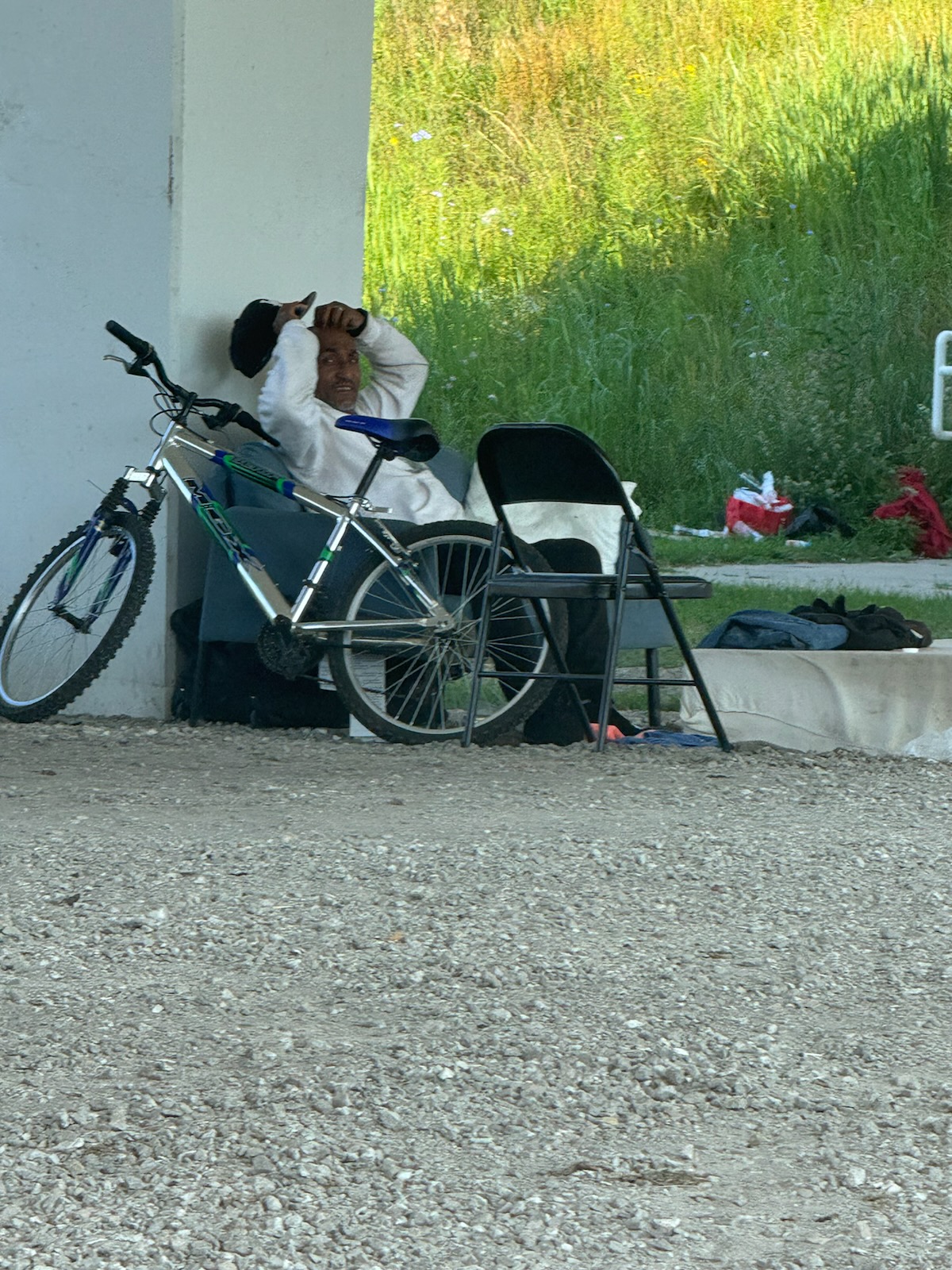An RNC Field Guide from Inside and Outside the Armed Compound

I started writing this at Milwaukee’s Mitchell Airport waiting to catch a long delayed flight back to Newark having spent the full week covering the Republican National Convention. I am stationed on the floor near an electrical outlet to recharge my phone.
From my ‘on the ground’ vantage point I have a birds eye view of the airport wheelchair attendants who are people of color straining to push disabled and obese RNC attendees to their gates for their departure flights back home.
I came here as the executive producer of Pacifica Radio Network’s We Decide: America at the Crossroads 2024, a community based reporting project I created that’s been funded by some of the nation’s largest unions as well as state and regional locals.
The concept, inspired by my reporting on the City of Trenton, that lies beyond the State Capitol Complex, was to cover the national political conventions through the context and experience of the neighborhoods surrounding these multi-million dollar spectacles.
Might the duality in our state, where lawmakers spent $300 million on rehabbing their gold dome Capitol, while the City of Trenton struggled, extend to the convention host cities of Milwaukee and Chicago and the nation?
Could the pronounced wealth divide and concentration that manifested in Trenton be a manifestation of a widening disconnect between the political class and the circumstances of the people they purport to represent be also evident with the RNC and DNC gatherings?
Is there actually any connection between our abstract concepts of democracy, how it’s been framed historically and how the major two political parties conduct themselves in 2024? Has the billions in corporate money that feeds the spectacle totally big footed the conversation between the American people and their political leaders that are beholden to the big donors?
We produced a nightly national two hour live broadcast from 104.1 WXRW Riverwest Radio, a beloved low power community based FM station on East Center Street. The storefront radio station (think urban Northern Exposure) sits in a tree lined working class neighborhood that’s home to a number of dynamic cultural non-profits and where the unsheltered find an impromptu kind of sanctuary.
Our news gathering team included Madison Wisconsin’s WORT’s Sara Gabler, Faye Parks and Chali Pittman as well as WXRW-LP’s Keith Gaustad and Peter Donalds from Riverwest Radio. We were supported by technical teams in New York and in Wisconsin as well as nationally.
Pacifica is a progressive non-profit network that’s composed of WBAI (New York City) 99.5 FM, WPFW (Washington DC), KPFT (Houston), KPFK (Los Angeles), KPFA (San Francisco) as well as 250 affiliates. Our archives include the soundtrack of the 1960s and 1970s peace and civil rights movements.
While the corporate media and the Republican media auxiliary anchored their coverage from the heart of the spectacle, our approach was to be both on the floor of the convention and to embed ourselves in the community outside the compound in order to get a feel for how the broader community experienced the RNC.
Who were the winners and losers? Who was left out of the conversation? Did the promised economic development windfall happen? How did the Black Democratic Mayor of Milwaukee justify hosting a former President who vowed to be a dictator on his first day in office?

My first national political convention was in 2000. With the passage of the Presidential Protection Act of 2000, and 9/11 the quadrennial gatherings have increasingly become paramilitary affairs. The just concluded RNC gathering was no exception. Thanks to a fortified hard perimeter cutting of a major swath of downtown Milwaukee between the Fiserv complex that hosted the RNC and the Milwaukee River anticipated convention foot traffic never materialized.
It's kind of ironic. The Jan. 6 violent mayhem caused by Trump’s partisans fighting to derail the certification of Joe Biden as president and Kamala Harris as vice-president no doubt informed this 21st century feudalism risk threat matrix that required a moat in Milwaukee.
The City of Milwaukee was the beneficiary of a $75 million federal windfall to cover the cost of security and mustering an ad hoc complement of 4,000 law enforcement officers from a wide array of state, regional and local police agencies, including a large contingent of New Jersey State Police, all under the direction of the U.S. Secret Service.
Keep in mind that in 2016, Donald Trump carried Wisconsin and while the state has had a proud progressive tradition, it elected Scott Walker, a Republican governor, and both houses of the state legislature are controlled by the Republicans since 2011.
It’s a battleground state.
In a wide ranging interview, Milwaukee Mayor Cavalier Johnson, a Democrat, expressed strong support for President Biden and the Democratic Party but didn’t see his city’s hosting former President Trump as a contradiction with his political values.
“It doesn’t really matter where Donald Trump accepts the Republican nomination—if he wins the whole country would be under that rule—I think that’s a straw man argument,” Johnson said. “There is an opportunity though for us to elevate Milwaukee and put Milwaukee on the map nationally and globally and grow our hospitality and tourism industry laying a better foundation for workers on the ground many of whom are people of color working in that industry.”
Being clued into the city outside the hard perimeter gave the Pacifica team a distinct advantage for covering the fatal shooting on Tuesday of Samuel Sharpe Jr., a homeless veteran, who was shot by five Columbus, Ohio police officers about a mile outside the RNC perimeter.
Police reported that Sharpe was wielding a knife.
“The thing that becomes so difficult here is who is to be held accountable because it was obviously Columbus (Ohio) Police are going back to their state and city but we invited them here and who is to answer for how this happened,” Aurelia Ceja, co-chair of the Milwaukee Alliance Against Racist and Political Repression, told us.
Local community police accountability activists had warned that the mass formation of disparate police units thrown together for four days carried real risks for the local population.
In the weeks leading up to the RNC with the buildout underway, private security guards beat Dvontaye Mitchell, an unarmed Black man at the Hyatt Regency, which the key press check point for getting entry into the RNC.
On Wednesday morning I went out to a TV production facility on the industrial periphery of Milwaukee to tape an interview on Democracy Now about Sen. Bob Menendez’s conviction and the police killing of a local Milwaukee unsheltered veteran by five out of state police officers a mile from the RNC perimeter.

Walking back to the downtown along the railroad tracks and under the massive interstate over passes there was a mix of vacant industrial sites and the tents housing homeless people. This neck of town also housed what can only be described as the back lot for the massive federal, state, and regional police command center with a fleet of specialty vehicles that monitored what was going on.
It was a provocative juxtaposition, the hardware and rolling stock of a multi-billion dollar national security state parked in the same neighborhood where the homeless slept. In a country that spends close to a trillion dollars on the military, there’s a lot of misery and scarcity that gets ignored at the margins.
Milwaukee, a city with a long tradition of electing socialist Mayors, had successfully bid for and gotten the DNC nod to host the Democrats 2020 convention. COVID derailed those plans but the city’s dry run gave them a leg up for getting the GOP’s 2024 convention.
Local businesses complained to any reporter who would ask that the promised windfall from the RNC never materialized. But the Milwaukee Area Service and Hospitality Workers Organization, an independent union that represents the workers at the Fiserv complex, did see a significant pay boost.
In fact, the very existence of the union, was a consequence of the success of local organizing in response a few years back to the Wall Street types who owned the Milwaukee Bucks and threatened to pull the basketball team out of the city unless they got hundreds of millions in support from taxpayers for the construction of what is now the Fiserv Forum and surrounding redevelopment district.
Peter Rickman, president of MASH, an independent union, told me 25 percent of his 1,100 members opted not to work the RNC, which their master contract with the venue permits. MASH workers got a $4 an hour boost as well a $2 differential if they worked over night.
“That’s the power of a strong local union and it’s an incredible lift for people who have to pay their rent,” Rickman told me.
However, the union leader noted there were venues his union serves that opted to close during the heavily policed RNC. “My view this has not been a net positive,” he said. “I’ve heard from our members that work elsewhere, for all the promises that have been made, very little has returned on that.”
The RNC did generate well organized local peaceful protests that drew several hundred participants that were kept far away from the militarized perimeter. In one of the so called free speech zones way outside Fort RNC a few dozen activists gathered to highlight the nation’s drug overdose epidemic and deepening healthcare crisis.
These activists had come from all over the country to tell their individual story about the loss of a loved one to opioids and a health care system that puts profits over people.
Alexis Pleus, is the founder and executive director of Truth Pharm, which is committed to reducing the “harms of substance abuse” and confronting “the failing of our government to care for those who need help, treatment, harm reduction programs, non-discriminatory practices and policies.”
Pleus lost her son in 2003 who was prescribed opioids after a knee surgery. She had traveled from Binghamton, New York in hopes of speaking with the RNC delegates and elected officials.
“We were out here to talk to people about the overdose epidemic and what we want from our elected officials and candidates. We anticipated an audience but we didn’t have that because somebody chose to put demonstrators out here in the middle of where no one is listening,” she told me. “It’s an incredible disappointment. Our message is truly not political. We believe that every candidate, left or right, Democrat or Republican, all have an opportunity to do the right thing. And our message typically resonates with all of them and so why on earth remove us from the people we need to talk to?”
Pleus said the over emphasis on securing the RNC had short circuited any link of the GOP event to democracy.
“We need to 100 percent reevaluate how we are doing these [the national conventions],” she told me. “One of the people in our group joked yesterday and said maybe they need to just pick a piece of land in Kansas out in the middle of nowhere where they can have their conventions. They are disruptive to downtown communities and they are disruptive literally to democracy because they are not even giving people the chance to speak to the very people that need to hear us…For them to remove us out of the action is absolutely outrageous.”
Pleus noted the vast expense of securing the RNC and the plight of the homeless which was clearly evident everywhere you looked in the city.
“This is exactly what we have been talking about the last couple of days,” Pleus said. “Even things we have been hearing from candidates about being so angry about the unhoused while they are oozing money into this convention that could house hundreds of people. If they don’t like tent cities and unhoused people, let’s put them inside houses but no, they’d rather waste money on this political charade than actually take care of American people. It’s also why we have an addiction crisis and an addiction epidemic. Young people don’t have hope for their future in this country anymore.”
Pleus also plans on attending the DNC because she thinks both parties are implicated in America’s healthcare dysfunction.
“What we have to think about is that America’s healthcare system is embedded in desiring profit,” she said. “We don’t have universal healthcare. We have big money mixed into medical care. It will never work. We look at what our nation spends per individual, compared to other countries.”
Pleus continued. “We spend the most and we have the worst results. We have the highest overdose fatality rate literally in the world. Our life span has been reduced… Big pharma has no interest in making us better. Big pharma has an interest in being richer and richer until it kills us all. They make customers. They don’t make cures.”
You can bet that the one thing big pharma has at both the RNC and DNC is access.







TJ, as I affectionately call Thomas Jefferson, previously stated that he is glad he sold his house. So, I assume he sits in his apartment or perhaps a tent, insulting a columnist. A columnist who is talented, kind, and caring, basically a fine human being. This world needs more Robert Hennellys and less people who demean others!
The writer explains that he's a socialist propagandist working for and with "progressive" low power community based FM station on East Center Street. In other words, the writer works for and with a Socialist propanda media outlet. After reading his long-winded tome that stated absolutely nothing, there is a bit of fact-checking that needs to be brought out here. The writer claims that Milwaukee did not reap the financial benefits of the Republican National Convention. That's a blatant lie, and the writer should be fired for journalistic malpractice and spewing false information to the public. According to the Mayor's office in Milwaukee, the city and surround suburbs profited to the tune of well over $250 MILLION DOLLARS in spending for the 4-5 days of the convention by Republicans. Restaurants, stores, hotels, gas stations, convenience stores, retail shops, etc. were frequented by the Republican attendees, who spent significant money while there for the 4-5 days. The writer needs to check facts before going off on one of his brain-addled rants. Sounds like he has "Joe Biden syndrome". No brains left.